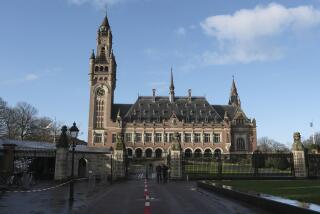Hong Kong Protesters Assail Beijing Decision
- Share via
BEIJING — Hong Kong protesters and opposition politicians assailed a controversial decision Saturday by China’s legislature to give Beijing, and not the former British colony, the final say on which mainland residents can move there.
The Beijing decision may have allayed the long-standing fears of some Hong Kong residents that their densely populated, recession-racked territory would be swamped by mainland Chinese immigrants.
But outraged politicians, jurists and human rights advocates asserted that the move undermined Hong Kong’s judicial independence and will keep families divided by the China-Hong Kong border from ever being reunited.
Under a massive yellow banner proclaiming, “[Chief Executive] Tung Chee-hwa ruins the rule of law, ruins Hong Kong,” dozens of demonstrators in the territory, including opposition party members and mainland Chinese without residence permits, jostled with police outside key government buildings.
Hong Kong’s bar association, meanwhile, issued a statement regretting the decision, and local lawyers began planning mass protests for this week.
Martin Lee, the popular leader of the Democratic Party, castigated Beijing, saying China’s leaders “have not come up with any good reason why they did this. That’s why I am compelled to think the [Chinese] central government has ulterior motives. It would like to control the courts.”
Hong Kong’s Court of Final Appeal ruled in January that any mainland Chinese citizen with at least one Hong Kong parent was eligible for a residence permit, even if the individual was born out of wedlock or before one of his or her parents had the right of abode in the territory.
But subsequently, the Hong Kong government asked the Chinese legislature to “reinterpret” the territory’s Basic Law, the mini-constitution agreed on by Britain and China in 1984.
The Standing Committee of the National People’s Congress said the Basic Law gives the right of residence only to children with at least one parent who was a Hong Kong resident when the child was born. And the Beijing decision said the Hong Kong court violated the Basic Law by not consulting the legislature in Beijing before deciding such a case.
With the Hong Kong court’s decision effectively overruled, mainlanders with Hong Kong parents will have to pass strict Chinese immigration procedures and quotas to move to Hong Kong.
According to the Hong Kong government, the decision will reduce the number of mainland Chinese eligible for the right of abode in the territory, from 1.6 million to 200,000, although critics dispute the figures.
However, Tung announced at a news conference that his government will not expel an estimated 3,700 mainland immigrants who claim to have a resident parent and who arrived in the territory between the July 1, 1997, hand-over from Britain and the Jan. 29 Court of Final Appeal ruling.
The constitutional crisis is the first since Hong Kong became a special administrative region of China two years ago, and it highlights the difficulties of implementing China’s “one country, two systems” formula for preserving the territory’s autonomy.
Under the common law system that Britain left to its former colony, Hong Kong’s judiciary has the sole power to interpret laws. But China’s constitution and the Basic Law give that power to the Standing Committee of China’s legislature, the National People’s Congress.
At his news conference, Tung stressed that his request for Beijing’s intervention was a last resort.
“You can rest assured that only under very special circumstances will we go through this channel,” Tung said. “I want to assure you that we treasure the rule of law as one of the most important pillars of Hong Kong’s success.”
More to Read
Sign up for Essential California
The most important California stories and recommendations in your inbox every morning.
You may occasionally receive promotional content from the Los Angeles Times.













